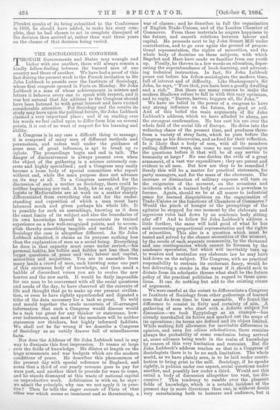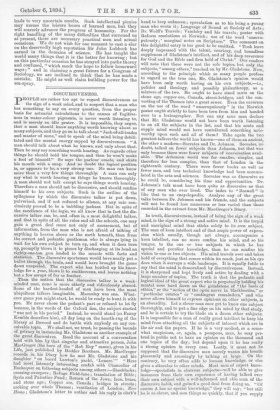THE SOCIOLOGICAL CONGRESS. T HOUGH Governments and States may wrangle and
bicker with one another, there will always remain a kindly fellow-feeling between the learned men of one country and those of another. We have had a proof of this fact during the present week in the French invitation to Sir John Lubbock to preside over the Institute of Sociology, whose first congress opened in Paris on Monday. Sir John Lubbock is a man of whose achievements in science and letters it behoves every one to speak with respect, and it was but natural that his address to the Congress should have been listened to with great interest and have excited considerable attention. For Sociology and the results its study may have upon the political future, Sir John Lubbock claimed a very important place; • and if on reading over his words we feel called upon to differ from him on several points, it is out of no want of respect for his learning and ability. A Congress is in any case a difficult thing to manage ; it is composed of many men of different methods and persuasions, and unless well under the guidance of some man of great influence, is apt to break up re infeeta. The proceedings begin and end in talk. The danger of discursiveness is always present even when the object of the gathering is a science extremely con- crete and highly specialised ; and a Congress may easily become a loose body of special committees who report without end, while the main purpose does not advance on its way at all. To a Congress assembled for the discussion of such a matter as Sociology, there could be neither beginning nor end. A body, let us say, of Egypto- logists or Mediaevalists are at work on a matter sharply differentiated from everything else and for the under- standing and exposition of which a man must have laboured much and given perhaps his whole life. It is possible for such an assemblage, knowing as it does the exact limits of its subject and also the boundaries of its own knowledge thereof to concentrate its trained experience on a few well-recognised points, and to accom- plish thereby something tangible and useful. But with Sociology the case is altogether different. As Sir John Lubbock admitted, it claims as its purpose nothing less than the explanation of man as a social being. Everything he does in that capacity must come under review,—his personal habits, his follies and foibles not less than the larger questions of peace and war, labour and capital, minorities and majorities. You are to assemble from many lands a crowd of men, each knowing some one part of this enormous body of knowledge, and then amid a babble of discordant voices you are to evolve the new heaven and the new earth. It would be flatly impossible for one man to be conversant with all the social questions and needs of the day, to have observed all the currents of life and thought that go to make up our present civilisa- tion, or even to have rightly apprehended and digested a tithe of the data necessary for a task so great. To weld and mould together the crude mountain of ill-arranged information that such a Congress would discuss would be a task too great for any thinker or statesman, how- ever industrious, and most of the members will be neither statesmen nor thinkers, but highly informed faddists. We shall not be far wrong if we describe a Congress of Sociology as an untidy drawer full of miscellaneous facts.
Nor does the Address of Sir John Lubbock tend in any way to dissipate this first impression. It roams at large over the fields of knowledge. He dilates at length on the huge armaments and war budgets which are the modern conditions of peace. He describes this phenomenon of the present day with special reference to England, and notes that a third of our yearly revenue goes to pay for wars past, and another third to provide for wars to come, and he stands dismayed at this waste of national capital on unproductive work. Arbitration is with us, he says : we admit the principle, why can we not apply it in prac- tice ? Then he tells the eager savants of Paris of that other war which seems so imminent and so threatening, a war of classes ; and he describes in full the organisation of English Trade-Unions, and of the London Chamber of Commerce. From these materials he augurs happiness in the future, and smooth relations between labour and capital. He proceeds next to lay John Stuart Mill under contribution, and to go over again the ground of propor- tional representation, the rights of minorities, and the whole body of doctrine on these subjects, with which Bagehot and Hare have made us familiar from our youth up. Finally, he throws in a few words on education, depre- cating the superabundance of book-learning, and advocat- ing technical instruction. In fact, Sir John Lubbock pours out before his fellow-sociologists the modern time, full of interest and of difficulty. Like Shakespeare's Sir John, he says, "'Fore God, you have here a goodly dwelling and a, rich." But there are many reasons to make the modern Shallows refuse to fall in with this easy optimism, and to reply, "Barren, barren; beggars all, Sir John." We have no belief in the power of a congress to have any strong influence on the future, for good or evil. And of this belief the main arguments of Sir John Lubbock's address, which we have alluded to above, are the strongest confirmation. He has cast his eye over the whole field of the social life of Europe. He dives into the weltering chaos of the present time, and produces there- from a variety of stray facts, which he puts before the Congress as his discoveries, and as food for their reflection. Is it likely that a body of men, with all its members pulling different ways, can come to any conclusion upon the questions before it that will be of any service to humanity at large ? No one doubts the evils of a great armament, of a vast war expenditure ; they are patent and evident to all men. But how aro they to be remedied ?
Surely this will be a matter for practical statesmen, for party managers, and for the mass of the electorate. The increase or diminution of military expense will turn on the exigencies of the moment, on the occasions and incidents which a trained body of savants is powerless to foresee. Again, should we be at all nearer to industrial peace for learned disquisitions on the organisation of Trade-Unions or the functions of Chambers of Commerce ? Would the pinch of hunger or the promptings of the agitator be stopped for one moment by the elaborate and ingenious rules laid down by an academic body sitting afar off? And to follow Sir John Lubbock's address a little further, the same will hold good of what he has said concerning proportional representation and the rights of minorities. This also is a question which must be tested and solved by the chance necessities of the moment, by the needs of each separate community, by the thousand and. one contingencies which cannot be foreseen by the academic speculator, but which will inevitably turn up to weaken and neutralise any elaborate law he may have laid down on the subject. The Congress, with uo practical responsibility to restrain its exuberant fancy, would be but delivering a stroke in the water if it should seek to dictate from its scholastic throne what shall be the future policy of the practical politician in regard to these ques- tions. It can do nothing but add to the existing reams of argument. We were careful at the outset to differentiate a Congress or Institute of Sociology from other gatherings of learned men that do from time to time assemble. We found the difference to consist in fixity and certainty of aim. A gathering of men who start with a definite subject for discussion—we took Egyptology as an example—has already marshalled its forces and marked out the scope of its operations ; its terms are defined and its object limited. While making full allowance for inevitable differences in opinion, and even for odium, scholasticion, there remains always the probability of some conclusion being arrived at, some advance being made in the realm of knowledge by reason of this very limitation and restraint. But Sir John Lubbock's address teaches us that in a Congress of Sociologists there is to be no such limitation. The whole world, as we have plainly seen, is to be laid under contri- bution to bring grist to the mill. Sociology, if he speaks rightly, is politics under one aspect, social questions under another, and possibly law under a third. Would not this entail a body of discussion altogether too vast, too dis- cursive ? This tendency to ramble over the pleasant fields of knowledge, which is a notable incident of the present day in more directions than one, is without doubt very entertaining both to lecturer and audience, but it leads to -very uncertain results. Such intellectual picnics may amuse the leisure hours of learned men, but they will scarcely advance the progress of humanity. For the right handling of the many difficulties that surround us at present, there are necessary practical men and actual occasions. We do not wish for one moment to cast a slur on the deservedly high reputation Sir John Lubbock has earned in the domains of science. He has taught the world many things that it is the better for knowing ; but on this particular occasion he has strayed into paths thorny and confused, "which mock the hope to follow homeward ways ; " and in claiming a great future for a Congress of Sociology, we are inclined to think that he has made a mistake. He might as well claim building power for the sea-spray.







































 Previous page
Previous page